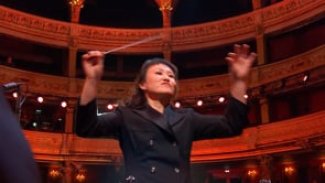




Julie Roset
“Roset’s singing would melt a heart of stone, uniformly gleaming yet shaped to perfection, and inhabiting every twist and turn of Handel’s matchless vocal lines.”
Europadisc Classical, August 2022
As Grand Winner of the 2022 Metropolitan Opera Laffont Competition, it came as little surprise when French soprano Julie Roset took First Prize at Plácido Domingo’s Operalia in 2023 and was crowned ‘Révélation Lyrique’ at Les Victoires de la Musique Classique in 2025. Breakthrough performances as Zémire (Zémire et Azor) at Opéra Comique brought unanimous acclaim, with Le Figaro writing “the young soprano catches the light with her singing, as natural as it is intelligent”.
Making an impressive debut at Opéra National de Paris as Amour (Médée) in David McVicar’s new production of Charpentier’s opera under William Christie, Julie Roset went on to join Raphaël Pichon and Claus Guth in an acclaimed staging of Rameau’s Samson at Festival d’Aix-en-Provence and subsequently at Opéra Comique. Additional highlights include Euridice and La Musica (L’Orfeo) in Sasha Waltz & Guests’ widely appreciated production at Teatro Real Madrid, and Ted Huffman’s inspired staging of L’incoronazione di Poppea at Festival d’Aix-en-Provence, both conducted by Leonardo García Alarcón.
See more
Across a glittering 2025/26 season Julie Roset demonstrates her innate versatility in a series of significant debuts, notably at the Metropolitan Opera as Fiakermilli (Arabella) under Nicholas Carter, at Opéra Comique as Sophie (Werther) in a new staging by Ted Huffman and conducted by Raphaël Pichon and as Blonde (Die Entführung aus dem Serail) at Glyndebourne Festival Opera under Louis Langrée. She also joins Rotterdam Philharmonic Orchestra as Waldvogel (Siegfried) led by Yannick Nézet-Séguin, debuts with Handel and Haydn Society as Michal (Saul) under Jonathan Cohen, performs Carmina Burana with Toronto Symphony Orchestra under Gustavo Gimeno, and sings L’enfant et les sortilèges with Frankfurt Radio Symphony Orchestra under Alain Altinoglu. Her debut solo recital disc, M’a dit amour (Alpha Classics), with pianist Susan Manoff, will be launched with performances in Paris, Prague, Nantes, and Barcelona.
Julie Roset made her debut with Orchestre de Paris in Romeo Castellucci’s deeply felt staging of Mahler, Symphony No.2 under Esa-Pekka Salonen, making her Salzburg Easter Festival debut in the same work, and further building her concert repertoire with performances of Händel, Messiah, Bach, Weihnachtsoratorium, Haydn, Die Schöpfung and Bach, St Matthew Passion. In concertante performance she has twice appeared at Salzburger Festspiele with Adam Fischer and Mozarteum Orchester, as Tamiri in Il re pastore and as Ismene in Mitridate, re di Ponto and as Belinda (Dido and Aeneas) with Danish National Symphony Orchestra and in Acis and Galatea with l’Orchestre Philharmonique de Radio France.
At the same time, her close collaborations with leading baroque ensembles have helped shape her artistic identity, and she maintains enduring ties with Cappella Mediterranea, Le Concert de la Loge, Les Arts Florissants, and Twelfth Night, with whom she made her Carnegie Hall debut in Elemental, a curated programme of baroque arias. With her own ensemble, La Néréide, she features on Luzzaschi: Il concerto segreto (Ricercar, 2023) and the forthcoming Le cœur et la raison (Alpha Classics) due for release this season.
Julie Roset’s musical education began at the Conservatoire du Grand Avignon, followed by a degree with honours from the Haute École de Musique de Genève. She went on to gain an Artist Diploma in Opera Studies at the Juilliard School in 2022, laying the foundation for a career that has already recognised her unique artistry, intelligence, and emotional depth.
Contacts
Shirley Thomson Senior Director, VOICE at HarrisonParrott | Head of CSR
General Management
General Management
Gallery








“Julie Roset’s Bellezza carries all the expected allure and freshness. We are dazzled by the purity of her tone, the delicacy of the phrasing, the assured technique, and the refinement of her ornamentation. Her warm, rich, and full vocal tone, exceptional breath control, lightness and projection, all inspire admiration. Without doubt, one of the greatest voices of our time.”
“Julie Roset has an extremely pure, fresh, and youthful voice, ideal for Phani, a role in which she gave a lesson in delicacy and expressiveness”
“Julie Roset can still easily shine with her crystal-clear soprano.”
“Julie Roset (Timna) excels in the more serene passages, showcasing beautiful phrasing and a delightful tone.”
“Julie Roset takes on the complex and rewarding role of Timna. She navigates the tricky turns of the arias and duets with great virtuosity, demonstrating musical maturity, excellent pronunciation, flexibility in the high notes, and remarkable tone quality.”
“The excellent Julie Roset as Timna dazzles with her magnificent tone and flawless agility.”
“From the very first notes of this aria, Julie Roset captivates the listener with a voice of crystalline purity and remarkable delicacy, both in the melodic line and the vocal embellishments. These few minutes of bliss alone would justify listening to the entire album.”
“Julie Roset’s celestial soprano was clean and focused throughout”
“countering the spiritual glow from a resplendent RNSO chorus and ethereal luminescence from soprano Julie Roset”
“Julie Roset portrays Amour as both mischievous and reassuring, playing the role immensely despite the concert’s ‘recital’ version, getting involved at every turn, with meticulous diction, ease throughout the upper tessitura and, above all, an appreciable focus and breadth of timbre that give her arias a particular brassy flavour and generosity.”
“Her high notes are brilliant, her vibrato under control, and her fluid vocal line adds an ethereal dimension to her interpretation.”
“Julie Roset is impressive in her confidence and ease. Her ability to vary her interpretation sometimes as a voluptuous languor, sometimes as an otherworldly beauty of suspended high notes and sometimes as an assertive projection, the roundness of the timbre remaining immutable.”
“Julie Roset (freshly crowned at the prestigious Operalia Competition) demonstrates a warm, flexible, brilliant, and richly nuanced voice in a singing style that effortlessly shapes the music.”
“Julie Roset is an Amour with a clear, shiny and warm voice, playing with the score by offering effects that are as brilliant as they are agile”
“Julie Roset is the jewel of the evening: her disconcertingly easy high notes reflect obvious grace and charisma. The portrayal of Amour is the most successful and the singer’s mischief delights the spectator. It is an understatement to say that this is a sensational debut at the Paris Opera.”
“Julie Roset won over the audience with the freshness of her tone, the sovereign beauty of her phrasing and the delicacy of her musicality. Perfectly equal in all registers, ideally projected, her voice with its silver tone is reminiscent of the greatest singers who have ventured into this score.”
“Julie Roset always springs forth like a cathedral spire, embodying simplicity, but never omitting depth. Her magnificent projection responds to a breathtaking mastery of resonance with the orchestra. Her voice expresses the words beautifully and her musical interpretation is especially moving. It will take time to find an artificial intelligence capable of surpassing the pleasure of listening to this rising soprano!”
“[Julie Roset] immediately exults in the aria “ Tornami a vagheggiar ” from Alcina , her voice bursting forth with dizzying ease. The ease also derives from her ornamentation of the Da Capo, giving priority to the high notes in spectacular flights. The careful delivery preserves all the delicacy of the timbre and evokes the languor of amorous waiting by stretching out the sounds adorned with a warm vibration.”
“Julie Roset’s silvery soprano deepened throughout the performance: another well-judged and well-executed trajectory.”
“In the role of Love, Julie Roset stands out for the lightness of her range, the brilliance of her tone as well as her deeply baroque attacks.”
“In the role of Zémire, [Julie Roset] reaches great heights with her singing which is as natural as it is intelligent, light in the high register, strong in the middle register, with agility and luminous legato. Her technique paves the way for expression: the future is at her feet.”
“Julie Roset (Zémire), fresh as a rose, a coloratura with strength in her tone, plays with vocal pyrotechnics and astounding ambition in the ‘air de la fauvette.”
“The queen of the performance is without question Julie Roset. […] Her high notes are rounded and full of tender harmonies, her vocalises have a liquid agility, the middle register is strong and she portrays Zémire with sincerity. All these qualities are present in the aria ‘La Fauvette avec ses petits’ where her voice never seems forced, even in the highest register which flows with ease, the canto di sbalzo is splendid, […], and the trills have the precision of the beating wings of a colibri bird. All that is already remarkable, but what’s more is that she succeeds in tainting the first part of the aria with a hint of fear, while the second part shines with a melancholy delivered with stunning simplicity, and the reprise of the first part explodes with courage, as if she is already certain that Azor has been convinced to set her free.”
“Having already performing in various projects with Leonardo García Alarcón, Julie Roset (Ange, Gabriel et Eve), makes herself known through the beauty of her voice and her incredible ease in the top register[…] the young soprano demonstrates art at the highest level, musically and poetically — every note counts. A revelation for lots of listeners and an artist worth following very closely.”
“Julie Roset is quite simply astounding! She has everything: beautiful tone, vocal flexibility, sensitivity, virtuosity… Her first appearance is splendid, the ‘air de printemps’ is full of freshness and joyfulness, and bird-like in its agility.”
“The French soprano Julie Roset was the gentle Euridice and La Musica, performing with vocal and physical suppleness.”
“Roset sings with crystalline beauty and heartfelt sincerity; the technical élan and exuberance of the ‘Quonaim’ finale have irresistible conviviality.”
“Vocally, we must highlight the magnificent work of Julie Roset, one of the countless emerging talents of the French Baroque”
“The young French soprano Julie Roset is a Euridice to consider for the next decades, both musically and vocally, to which is added her versatility to dance alongside the virtuosos of the company Sasha Waltz.”
“This voice, so moving in its simplicity, brings to these pieces a real aura of sincerity: a little gem”
“Unquestionably, Julie Roset’s star shines with an increasingly assertive brilliance. The qualities are obvious: technical solidity, supple and precise agility, freshness of a delightful timbre. It dwells with touching simplicity in the relatively well-known motets of Händel.”
“We can only salute the judicious choice of Leonardo Garcia Alarcon to assign the soprano Julie Roset the role of Galatea. Her voice works wonders in this complex role requiring perfect vocal mastery.”
“To embody the charming Galatea, an almost idealized paragon of love, the young Julie Roset deploys the freshness and lightness of her voice, particularly in the subtle vocalizations “
“The angelic sweetness of Julie Roset’s soprano suited the gentle Euridice of the first two acts, and in Act III, when she visited the suicidal Aristeo as an avenging wraith, she summoned an unexpected vehemence of declaration.”
“Julie Roset (Amour) has both superb timbre and supple agility.”
“Julie Roset’s sharp and mischievous Amour demonstrates beautiful high notes and a very pure line.”
“Julie Roset ….. the sparkling and lively soprano brilliantly performs her victory duet with Prometheus.”
“In the role of the Philistine, the young Julie Roset is quite simply flawless. Gentle without being naive, she imbues each of her passages with solid vocals and psychological insight.”




























